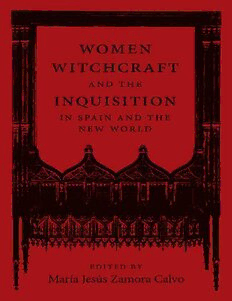
Women, witchcraft and the Inquisition in Spain and the New World PDF
Preview Women, witchcraft and the Inquisition in Spain and the New World
WOMEN, WITCHCRAFT, AND THE INQUISITION IN SPAIN AND THE NEW WORLD ANNE J. CRUZ, SERIES EDITOR WOMEN WITCHCRAFT AND THE INQUISITION IN SPAIN AND THE NEW WORLD EDITED BY María Jesús Zamora Calvo LOUISIANA STATE UNIVERSITY PRESS BATON ROUGE Published by Louisiana State University Press lsupress.org Copyright © 2021 by Louisiana State University Press All rights reserved. Except in the case of brief quotations used in articles or reviews, no part of this publication may be reproduced or transmitted in any format or by any means without written permission of Louisiana State University Press. DESIGNER: Michelle A. Neustrom TYPEFACE: Minion Pro LIBRARY OF CONGRESS CATALOGING-IN-PUBLICATION DATA Names: Zamora Calvo, María Jesús, editor. Title: Women, witchcraft, and the Inquisition in Spain and the New World / edited by María Jesús Zamora Calvo. Description: Baton Rouge : Louisiana State University Press, [2021] | Series: New Hispanisms : cultural and literary studies | Includes bibliographical references and index. Identifiers: LCCN 2021006865 (print) | LCCN 2021006866 (ebook) | ISBN 978- 0-8071-7561-3 (cloth) | ISBN 978-0-8071-7644-3 (pdf) | ISBN 978-0-8071- 7645-0 (epub) Subjects: LCSH: Inquisition—Spain. | Inquisition—Latin America. | Spain— Church history. | Spain—Colonies. | Witch hunting—History. | Women— Violence against—History. Classification: LCC BX1735 .W593 2021 (print) | LCC BX1735 (ebook) | DDC 272/.20946—dc23 LC record available at https://lccn.loc.gov/2021006865 LC ebook record available at https://lccn.loc.gov/2021006866 CONTENTS Acknowledgments Introduction MARÍA JESÚS ZAMORA CALVO I. Women and the Spanish Inquisition Defeated Demons, Battered Women: The Bodies of Diabolical Possession BEATRIZ MONCÓ REBOLLO The “Fallen Women” of Francisco Rizi’s Profanación de un crucifijo o Familia de herejes azotando un crucifijo SONIA PÉREZ-VILLANUEVA Catalina Mateo: Portrait of a Witch in Sixteenth-Century Castile MARÍA JESÚS ZAMORA CALVO II. Women and the Inquisition in the New World Toward an Inquisitorial History of Binding Spells or Ligatures: The Case against María de la Concepción, a Gypsy in New Spain ALBERTO ORTIZ Maleficata Impotentia: From Malleus Maleficarum to the Eighteenth- Century Enchantresses of New Spain CECILIA LÓPEZ-RIDAURA Midwives, Folk Medicine, and Magic in Early Modern Mexico ROBIN ANN RICE Self-Denunciation before the Inquisition: The Case of Felipa Olaeta in Eighteenth-Century New Spain YADIRA MUNGUÍA The Personification of Erysipelas in Two Eighteenth-Century Spells from New Spain CLAUDIA CARRANZA VERA & JAIR ANTONIO ACEVEDO LÓPEZ The Cultural Construct of the Witch: Inquisitorial Discourses GRACIELA RODRÍGUEZ CASTAÑÓN Marital Pains, Heterodox Cures: Alternative Economies of Sorcery and Witchcraft during the Cartagena de Indias Inquisition ANA MARÍA DÍAZ BURGOS Contributors Index ACKNOWLEDGMENTS My greatest debt is to my family: my son, my husband, my mother, my brothers, to whom this book is dedicated with my dearest love. To thank every colleague who contributed an insight, criticism, or reference would be impossible; I am grateful to all. Special thanks go to my students at the Universidad Autónoma de Madrid (UAM), Spain, for their care and curiosity, and for their enthusiasm and vitality. To Anne J. Cruz, soul and heart of this book: thank you so much. I thank all those persons and institutions that have contributed to publishing this book: R&D Excellence Project for the Ministry of Economy and Competitiveness of Spain (FEM2016-78192-P), financed by the State Agency for Research (Agencia Estatal de Investigación—AEI) and the European Regional Development Fund (ERDF, EU); as well as the research group “Magical Mentalities and Anti-Superstition Discourse (Sixteenth, Seventeenth, and Eighteenth Centuries),” Universidad Autónoma de Madrid. To my contributors, my thanks for your trust in this project and for helping us bring back from oblivion these unique women who, with their own voices, fought against the restrictions imposed on them by the Inquisition of their time. May their names and identities be remembered so that society today will not forget where we come from and perceive a clearer path to follow. Read and reflect—skillful reader—; we dedicate this book to you. WOMEN, WITCHCRAFT, AND THE INQUISITION IN SPAIN AND THE NEW WORLD Introduction MARÍA JESÚS ZAMORA CALVO A mong Inquisition files, there are numerous cases of women who break their silence to relate the reasons why they were prosecuted by an Inquisition that did its utmost to erase their names and identities from history. Women represented a minority of cases brought before the Spanish and American tribunals. Mostly poor and uneducated, they were often accused of such minor offenses as witchcraft and sorcery. Yet, while these offenses rarely led to forceful physical punishment, the persecution, public discipline, and imprisonment suffered by the accused were nonetheless traumatic and unjust. In a system as closed and secretive as the Inquisition was, its rule hierarchical and misogynistic, women came under laws, punishments, and judgments that were frequently arbitrary and capricious. The essays in this volume bring to light inquisitorial cases in which women were subjected to anonymous accusations, secret detentions, persistent interrogations, and sentences that almost always led to conviction, and whose prosecutions frequently cast a shadow of hatred, rejection, and marginalization. During the last few decades, scholars have examined the roles of women during the inquisitional period and in so doing have contributed to the reclamation of women’s history in the early modern period. Historical monographs have uncovered the lives and voices of women buried in inquisitional records and testimonies and underscored the perils women faced against the authoritarian structures of church and state in early modern Spain and the Americas.1 The essays in this collection continue and complement the work begun by these pioneers in their own studies of women under trial by the Inquisition and who were branded in many cases
